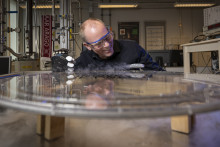BRAINS is directed by Professor Wilfred van der Wiel and Professor Hans Hilgenkamp, who established the center last year. ‘We want to combine all the efforts in brain-inspired nano systems at the UT and work together on the next generation of computing hardware that is smarter, more powerful and, most of all, energy efficient,’ says Van der Wiel.
Multidisciplinary team
The center brings together leading experts from many fields, including nanotechnology, computer science, artificial intelligence and neuroscience. All this expertise is necessary to lay the groundwork for a completely new type of electronics that is inspired by the human brain, explains Van der Wiel.
‘We want to step away from the conventional architecture currently used in computers. We want to realize artificial neural networks that can form the base for a new generation of computers. For that we need to develop completely new building blocks – adaptive materials, artificial neurons and synapses, neuromorphic architectures and so on. We therefore need to understand how the brain works, but also master the fundamentals of computing and nanomaterials.’
Scientists involved in BRAINS
Directors:
- Wilfred van der Wiel, Professor of Nano Electronics, EWI
- Professor Hans Hilgenkamp, Professor of Applied Physics, TNW
- Peter Bobbert
- Alexander Brinkman
- Hajo Broersma
- Bernard Geurts
- Gertjan Koster
- Bram Nauta
- Guus Rijnders
- Frank van der Velde
- Peter-Paul Verbeek
- Willem Verwey
- Richard van Wezel
- Floris Zwanenburg
‘Our brain still outperforms computers’
Essentially, the scientists involved in BRAINS aim to develop hardware for Artificial Intelligence (AI). ‘This would naturally have a broad scope of applications, from pattern recognition to facial recognition, to autonomous driving, medical applications and more,’ says Van der Wiel. ‘Many of these things are already possible, but we still need large computational power and very big data centers – which can be a problem in a self-driving car, for example. That is why we use the brain as inspiration. Our brain still outperforms computers in many ways, while consuming relatively little energy. We don’t aim to recreate the brain, but we want to understand and replicate its architecture, its fundamental characteristics.’
As Professor Hans Hilgenkamp explains in a recent cover story, hardware is fixed in a computer, but in the brain it’s always adapting. ‘The brain’s hardware uses connections that develop every time you learn something new. This is what they call the plasticity of the brain. We therefore want to create materials that can develop themselves as well, that can learn. We could call them learning materials, also known as neuromorphic computing.’
Hook up your brain
According to Van der Wiel, one of the ‘ultimate dreams’ for this line of research would be to interface the natural neural networks, meaning the brain, with artificial networks. ‘In simple words, to hook up the brain-on-a-chip with a real brain,’ says the scientist. ‘If we achieved that, could we make the brain smarter in a way? Or could we replace a part of the brain that has been damaged? To make this happen, we need to speak the same language as the brain, send it signals that it understands and can use. Such interfaces and applications of course come with many ethical and philosophical issues, which is why we are also collaborating with our colleagues at the BMS faculty.’
The Center for Brain-Inspired Nano Systems will have its opening on the 27th of March in Vrijhof. Several externally funded proposals are already running within the center. The first official research projects under the umbrella of BRAINS should begin in the coming months.







